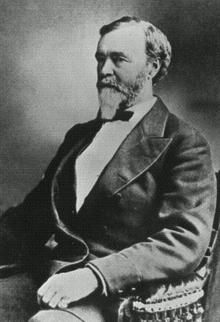William Gilpin
- Territorial Governor of Colorado from 1861-1862
- Party: Republican
View a description of holdings held at the Archives
Biography
First Colorado Regiment of Volunteers
William Gilpin, the first governor of the Colorado Territory in 1861-1862, was born in Pennsylvania on October 4, 1813. After two years of education in England, he returned to his home state to attend the University of Pennsylvania. He also spent one semester at the United States Military Academy.
Early Experiences
His education was augmented by a cornucopia of western experiences. Gilpin was part of John Charles Fremont's 1843 expedition which searched for a useful route over the Continental Divide. Other notable members of Fremont's second western expedition were Kit Carson and Thomas Fitzpatrick. Gilpin was also a Major in a United States regiment that marched to Chihuahua City during the Mexican-American War. As a result of this military experience Gilpin was given command of a volunteer force organized to suppress Indian uprisings in the West and to protect the Santa Fe Trail.
Territorial Governor
Despite Gilpin's almost legendary exploits and his nationally recognized efforts to promote western settlement, President Abraham Lincoln's decision to make him Territorial Governor of Colorado had little to do with his credentials. General William Larimer was initially the preferred candidate until Missouri governor Frank Blair entered William Gilpin as his personal choice. Missouri was a border state in the approaching Civil War and, as such, many concessions were made to make its politicians happy with the Union.
First Colorado Regiment of Volunteers
Gilpin's efforts to get the Colorado Territory organized was no small accomplishment, but, he is best known for raising troops to defend the region from Confederate invasion. In July of 1861 Gilpin requested that federal authorities allow and support the organization of Union forces in Colorado Territory. Washington officials refused this request not realizing that the Confederates had strongholds in both New Mexico and Texas.
Like his Coloradan forefathers, Gilpin took the initiative and organized the First Colorado Regiment of Volunteers. Some of the notable officers in this regiment were Colonel John Slough, Major John Chivington, Captain Edward Wynkoop, Captain Samuel Cook, Captain Samuel Logan, and Captain Richard Sopris. Despite this military talent there was no federal funding and inadequate supplies and ammunition. Governor Gilpin's fiscal remedy was to issue negotiable drafts directly upon the national treasury. While successful in its aim, it was technically illegal. Unable to make Washington understand the necessity behind $375,000 in unauthorized debt, Gilpin was removed from his gubernatorial post by a unanimous vote of the cabinet. Nonetheless, the illegally funded First Regiment distinguished itself by resisting Confederate General Henry Sibley's advances at Fort Craig, La Glorieta Pass, and Fort Union.
Futurist
William Gilpin was also an internationally recognized futurist, who was able to envision enormous potential for Colorado. Gilpin's vision of a world connected by railroads with Denver as its natural focus, was the basis of his theory of an Isothermal Axis, which today is a cornerstone of modern geopolitical theory. Furthermore, Gilpin's embellished and exaggerated advertisements of Colorado's resources lured many to the Territory of Colorado.
Gilpin died in Denver on January 20, 1894, and is buried in Mount Olivet Cemetery.
To Request a Record
To search our records, please see Archives Search.
To request a record from the Archives, please submit a formal request.
- See also our associated fees
